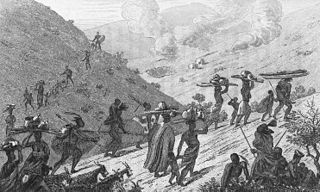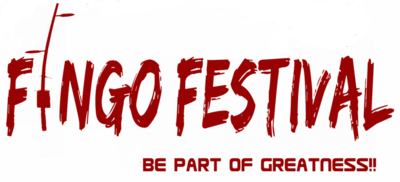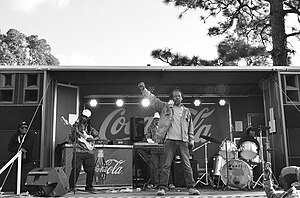
Interfaith dialogue refers to cooperative, constructive, and positive interaction between people of different religious traditions and/or spiritual or humanistic beliefs, at both the individual and institutional levels.

Makhanda, also known as Grahamstown, is a town of about 140,000 people in the Eastern Cape province of South Africa. It is situated about 110 kilometres (70 mi) northeast of Gqeberha and 130 kilometres (80 mi) southwest of East London. It is the largest town in the Makana Local Municipality, and the seat of the municipal council. It also hosts Rhodes University, the Eastern Cape Division of the High Court, the South African Library for the Blind (SALB), a diocese of the Anglican Church of Southern Africa, and 6 South African Infantry Battalion. Furthermore, located approximately 3 km south-east of the town lies the world renowned Waterloo Farm, the only estuarine fossil site in the world from 360 million years ago with exceptional soft-tissue preservation.

The amaMfengu was a reference of Xhosa clans whose ancestors were refugees that fled from the Mfecane in the early-mid 19th century to seek land and protection from the Xhosa. These refugees were assimilated into the Xhosa nation and were officially recognized by the then king, Hintsa. The term derives from the Xhosa verb "ukumfenguza" which means to wander about seeking service.
The United Nations Volunteers (UNV) programme is a United Nations organization that contributes to peace and development through volunteerism worldwide.
The Faith and Belief Forum, formerly known as the Three Faiths Forum (3FF), is an interfaith organisation in the United Kingdom.
The National Arts Festival (NAF) is an annual festival of performing arts in Grahamstown, South Africa. It is the largest arts festival on the African continent and one of the largest performing arts festivals in the world by visitor numbers.

Prior to 1994, immigrants from elsewhere faced discrimination and even violence in South Africa due competition for scarce economic opportunities. After majority rule in 1994, contrary to expectations, the incidence of xenophobia increased. Between 2000 and March 2008, at least 7 people died in what were identified as xenophobic attacks. In May 2008, a series of attacks left 12 people dead; although 10 of those killed were South African citizens. The attacks were partly motivated by xenophobia. In 2015, another nationwide spike in xenophobic attacks against immigrants in general prompted a number of foreign governments to begin repatriating their citizens. A Pew Research poll conducted in 2018 showed that 62% of South Africans viewed immigrants as a burden on society by taking jobs and social benefits and that 61% of South Africans thought that immigrants were more responsible for crime than other groups. Based on various police reports 60% of suspects arrested for violent crimes in Gauteng South Africa are illegal immigrants, between 2015 - 2016. The number of foreign nationals who have been arrested by the Johannesburg Metropolitan Police Department (JMPD) between 2016 and 2019 sit at 7841. Between 2010 and 2017 the illegal immigrant community in South Africa increased from 2 million people to 4 million people. The proportion of South Africa's total population that is foreign born increased from 2.8% in 2005 to 7% in 2019, according to the United Nations International Organization for Migration, in spite of widespread xenophobia in the country. This made South Africa the largest recipient of immigrants on the African continent in 2019.
The South African Unemployed Peoples' Movement is a social movement with branches in Durban, Grahamstown and Limpopo Province in South Africa. It is often referred to as the Unemployed People's Movement or UPM. The organisation is strongly critical of the ruling African National Congress government.
Rubin Phillip is bishop of the Anglican Diocese of Natal. The great-grandchild of indentured labourers from Andhra Pradesh, Phillip is the first person of Indian heritage in South Africa to hold the position of Bishop of Natal. He grew up in Clairwood, a suburb of Durban with a large concentration of people of Indian descent, in a non-religious household, but converted to Christianity. He was a noted anti-apartheid activist and spent three years under house arrest in the 1970s and was banned in 1973. He was enthroned as bishop in February 2000.

Makhanda, also spelled Makana and also known as Nxele, was a Xhosa indigenous doctor. He served as a top advisor to Chief Ndlambe. During the Xhosa Wars, on the 22nd of April, 1819, he initiated an abortive assault on the town of Grahamstown, in what was then the Cape Colony.

Makana Municipality is a local municipality which governs the town of Makhanda and surrounding areas in the Eastern Cape province of South Africa. It forms part of the Sarah Baartman District Municipality. The municipality is named after a Xhosa prophet and leader, Makana.
The Makana Botanical Gardens is a botanical garden in South Africa operated by Rhodes University, located in Grahamstown.
Ayanda Kota is an activist who was the founding chairperson of the Unemployed Peoples' Movement in Grahamstown, South Africa. He is also the President of the Makana Football Association. His political roots are in the black consciousness movement and he is strongly critical of the ruling African National Congress. He is currently the organiser for the Unemployed People's Movement.
Occupy South Africa was a South African initiative primarily aimed at protesting and inciting mass action against the racial, economic and social inequality in South Africa. It is part of the globally Occupy Wall Street movement. It consists of a loose informal affiliation of on the ground groups and individuals across South Africa as well as internet based groups. Groups such as Taking Back South Africa!, Occupy South Africa are involved in South Africa and online. The movement is also involved with the Marikana miners' strike.

Lévy Clément Madinda is a Gabonese professional footballer who plays as an attacking midfielder for Indonesian club Persib Bandung, on loan from Johor Darul Ta'zim, and the Gabon national team.
Christopher Michael Zithulele Mann(1948 – 10 March 2021) was a South African poet.

Nishant Kumar is a British stand-up comedian, television presenter, political commentator, and podcast host. He became known as the host of satirical comedy The Mash Report, now known as Late Night Mash. He has also presented BBC Radio 4 Extra's topical comedy show Newsjack, the Comedy Central series Joel & Nish vs The World, the BBC Radio 4 programme The News Quiz and Hello America on Quibi. Since May 2023, he has been the co-host of the political podcast Pod Save the UK.

The Battle of Grahamstown took place on 22 April 1819, during the Fifth Xhosa War (1818-1819), at the frontier settlement of Grahamstown in what is now the Eastern Cape province of South Africa. The confrontation involved the defence of the town by the British garrison, aided by a group of Khoekhoe marksmen, from an attack by a large force of attacking Xhosa warriors.
Andrew Frederick Buckland is a South African award-winning playwright, performer, film director, mime, and academic.
Surabhi Sharma is a filmmaker, educator and curator. based in Mumbai. India She has worked on several feature-length documentaries apart from some short fiction films and video installations. Her key concern has been documenting cities in transition through the lens of labour, music and migration, and most recently reproductive labour. Cinema verite and ethnography are the genres that inform her filmmaking.,











